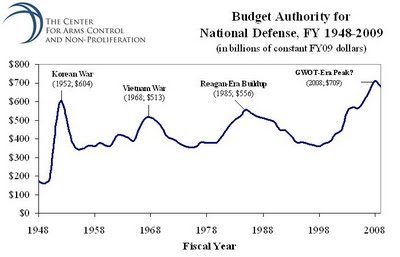-
A Response to Will Rogers’ “Budgeting for Climate”
August 19, 2009 By Miriam PembertonI have a few responses to Will Rogers’ thoughtful critique of my report, “Military vs. Climate Security: Mapping the Shift from the Bush Years to the Obama Era.”
Rogers says that “the report could be read as inferring that the Department of Defense (DoD) has an unnecessarily oversized budget”: that’s true. I think a single country that spends 43 percent of the world’s total military budget—more than the next 14 countries put together—and whose spending has nearly doubled since FY 2000 to the highest level in real terms since World War II, could find some ways to provide for the common defense with less money.

Rogers rightly points to the Obama administration’s efforts to cut the budget, citing the cancellation of the F-22. The administration has proposed the most ambitious set of cuts to unneeded weapons systems since the end of the Cold War. However, it has not proposed reinvesting some of the savings in averting climate change. Given the U.S. intelligence community’s assessment of climate change as a major global security threat, and the enlarged role the Department of Defense is assigning to this threat in their strategic planning, it should.
Rogers is concerned that my accounting of climate-change expenditures omitted some of DoD’s spending. This is a valid point, but I wanted to avoid double-counting. I used DoD’s own figures for its budget total, which would include, for example, DARPA’s budget. I tried to solve the problem by acknowledging DoD’s efforts, and providing a table of examples from all service branches. Maybe a better way to solve the double-counting problem would be to add a new category to capture military expenditures on climate change, including personnel costs, and deduct it from the other two.
Overall, Rogers’ real concern seems to be what he calls the “conceptual error” of contrasting military security with climate security. My point is that while the U.S. military is taking steps to reduce its emissions, its main job is to solve problems through military force. And it is warning that the problem of climate change is going to make this job much harder. As the intelligence services are telling them, either solve this problem by stemming rising global temperatures, or prepare to grow the military—a lot—to deal with the effects. It’s the old story of an ounce of prevention versus a pound of cure.
I am baffled at Rogers’ claim that pointing this out “makes climate change more like a domestic policy issue and less like a legitimate national security concern.” My point is that this legitimate national security concern needs more resources, and is best addressed largely by means other than military force.
The good news is that the Obama administration is about to release its own climate change budget, probably by the end of August. It will account for spending from both the Recovery Act and the regular budget, as mine does. It will undoubtedly be a more accurate accounting than mine, though it will not capture some categories I believe should count as climate-change spending, such as new allocations for mass transit.
My accounting of the relative balance of military versus climate security spending could certainly use refining, and I thank Rogers for helping me think through how to do this.
Miriam Pemberton, Ph.D. is a research fellow with the Foreign Policy In Focus Project at the Institute for Policy Studies. Her latest report is “Military vs. Climate Security: Mapping the Transition from the Bush Years to the Obama Era.”
 A Publication of the Stimson Center.
A Publication of the Stimson Center.




